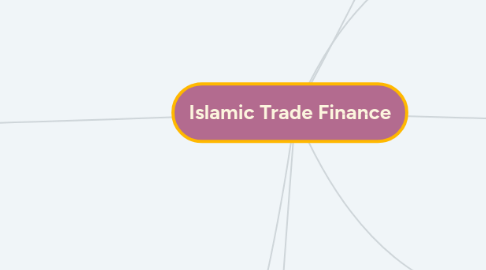
1. advantages of international trade organizations for different stakeholders
1.1. Improve local banking centres through training / awareness programmes
1.2. Enhance trade infrastructure through the development of Shariah and investment advisory services
1.3. Collaborate with strategic partners
1.4. Facilitate trade activities by supporting finance-centred liquidity
1.5. Diversify the supply of exported products
1.6. Monitor problems and maintain a closer dialogue with regulators
1.7. Adopt norms and international market standards and mitigate administrative procedures in international trade
1.8. Develop specific funding instruments
2. Main Shariah-Compliant Trade Finance Solutions
2.1. Murabahah
2.1.1. Islamic bank imports goods at the request of the customer and sells the same goods to the customer on a cost plus profit basis
2.1.1.1. Letter of Credit (LC), Trust Receipt-i and Accepted Bills-i
2.2. Musharakah
2.2.1. export and import transactions
2.2.2. agreement with the customer for the sale and purchase of goods whose specifications are provided by the client
2.2.3. profits or losses arising from the venture are distributed amongst the partners according to a pre-agreed-upon proportion
2.2.3.1. Musharakah financing
2.2.3.1.1. bank establishes the LC and pays the advising bank
2.3. Wakalah
2.3.1. bank works as an agent
2.3.2. Shariah-compliant LC
2.3.2.1. remits the payment by utilizing the applicant’s deposit
2.3.3. bank is paid fees and commissions for the services provided
2.3.4. has only legal and documentational risks
2.4. Kafalah
2.4.1. loans are guaranteed and all loans must be repaid according to Islamic law
2.4.2. guaranteed contract on certain assets, usufruct (property advantages), and services provided
2.4.3. Islamic Shipping Guarantee (SG-i) and Islamic Bank Guarantee (BG-i)
3. Challenges and Opportunity Areas in Islamic Trade Financing
3.1. Islamic Trade Finance Framework
3.2. Shariah-Compliant Trade Finance Product Development
3.3. Shariah Issues and Challenges
3.3.1. Islamic Trust Receipt (ITR)
3.3.2. Islamic Shipping Guarantee (SG)
3.3.3. Islamic Accepted Bills (AB-i)
3.4. De-Risking
3.5. Promoting SMEs through Islamic Trade Finance
4. Policy Recommendations and Key Findings
4.1. MDBs, Development Agencies, International/ Regional Commercial Banks, Local Banks, and Financial Institutions must work together
4.2. De-risking practices significantly affect traderelated transaction and can reduce exports
4.3. MDBs, Development Agencies, International/ Regional Commercial Banks, Local Banks, and Financial Institutions must work together
4.4. Multilateral organizations/banks should increase their trade finance facilitation programmes and bolster the capability
4.5. comprehensive regulatory trade finance framework
5. Background: Introduction and Importance
5.1. defined as a specific area of finance that examines underlying international trade transactions.
5.2. Shariah-compliant export and import financing tools
5.3. -Direct cash payments finance only a small portion of international trade -Conventional Trade Finance revolves around products such as credit or payment guarantees.
6. The Role of International Trade Finance Organizations and Multilateral Development Banks (MDBs)
6.1. The World Trade Organization (WTO) encourage the renewal and enhancement of the networks and links between stakeholders
6.2. determine the gaps in trade finance markets and ways fill the gaps with policy measures
7. Developments and Trends
7.1. Bank Payment Obligations (BPO)
7.1.1. an irrevocable document given by a buyer’s bank to a supplier’s or seller’s bank confirming that payment will be completed on an identified date
7.2. Supply Chain Finance and Blockchain Technology
7.2.1. banks automate documentary processing across the entire supply chain
7.3. Digital Trade Financing Platforms
7.3.1. simplify trade finance and would be a great benefit to companies to expand through Islamic trade finance
